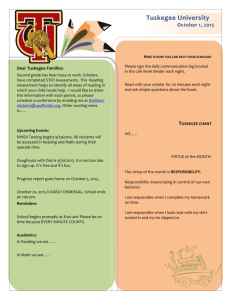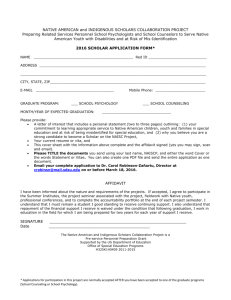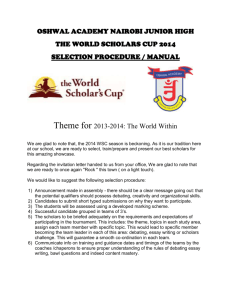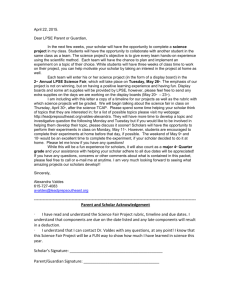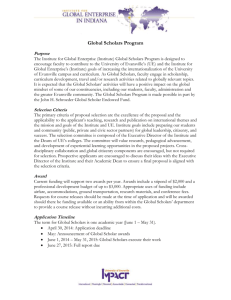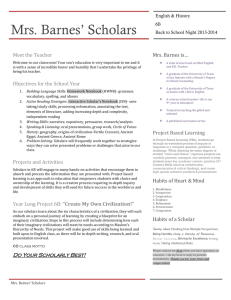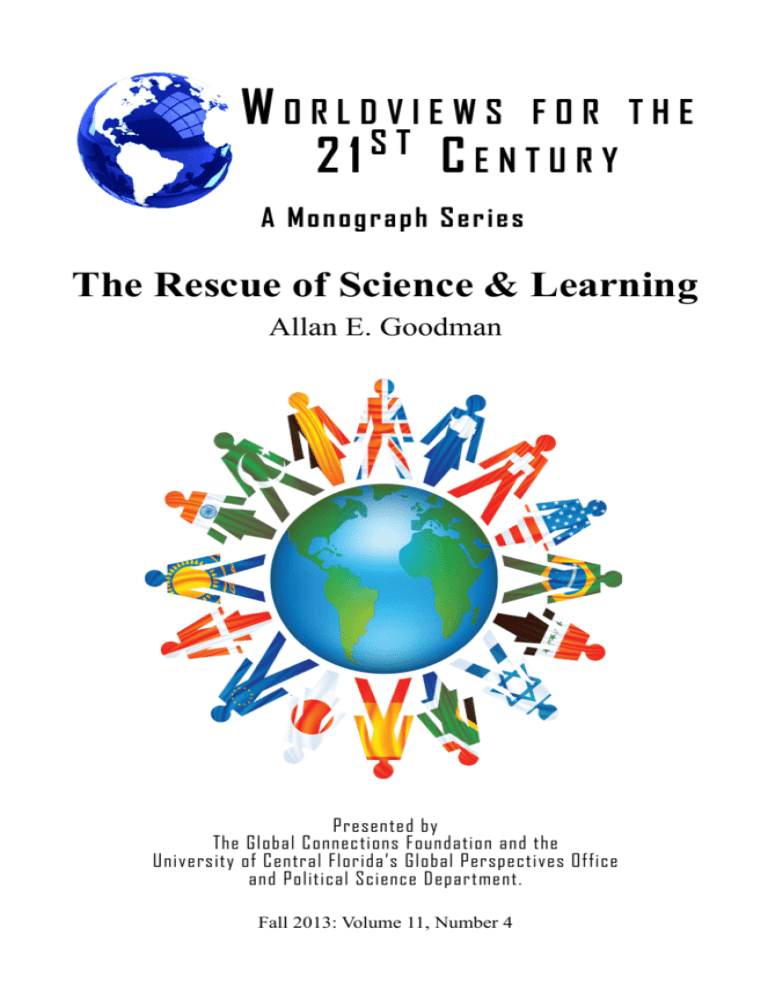
Worldviews for the
21st Century
A Monograph Series
The Rescue of Science & Learning
Allan E. Goodman
Presented by
The Global Connections Foundation and the
University of Central Florida’s Global Perspectives Office
and Political Science Department.
Fall 2013: Volume 11, Number 4
The Rescue of Science & Learning
Allan E. Goodman
Orlando, Florida, U.S.A.
Worldviews for the 21st Century: A Monograph Series
John C. Bersia, Editor-in-Chief
Jessica Gagnon, Marketing and Composition Editor
Jocelyn Figueroa, Business Editor
Lauren Adair, Editorial Assistant
The Global Connections Foundation, which evolved from an international
awareness-building program established in 1999, is a non-profit, non-partisan,
non-ideological educational partnership. Its initiatives include regional forums,
speakers, study/research programs abroad, awards and publications.
The Office of the Special Assistant to the President for Global Perspectives
(Global Perspectives Office) at the University of Central Florida was established
by President John C. Hitt in 2001 to sharpen the University’s international
focus. The office helps advance UCF’s goal of providing international emphasis
in curricula and research. In addition, it endeavors to expand the University’s
efforts to enlarge Central Florida’s awareness and understanding of the
interconnectedness of the global community.
The views expressed in this monograph are entirely those of the author, and do
not necessarily reflect the views of the staff, officers or advisors of the Global
Connections Foundation, the University of Central Florida’s
Global Perspectives Office or UCF’s Political Science Department.
Program Offices:
University of Central Florida
Howard Phillips Hall, Room 202
4000 Central Florida Blvd.
P.O. Box 160003
Orlando, Florida 32816-0003
U.S.A.
(407) 823-0935/0688
(407) 823-0716 (fax)
global@ucf.edu
Worldviews for the 21st Century
Volume 11, Number 4
Copyright © 2013 by the Global Connections Foundation
Copyright © 2013 by Allan E. Goodman
All rights reserved
The Worldviews for the 21st Century series,
a key part of the Global Connections Foundation’s
educational networking activities, gratefully acknowledges the support of the
Darden Restaurants Foundation.
The Rescue of Science & Learning
Allan E. Goodman
The Institute of International Education (IIE) has been rescuing
scholars since its establishment in 1919. For almost a century now,
we have found that professors on the front lines of their disciplines
often find themselves on the front lines of civil wars and sectarian
conflicts as repressive governments and terrorists seek to re-write
history and re-make their societies.
Consider this excerpt from a memoir written by IIE’s first president,
Stephen Duggan, reflecting on the work of the Emergency Committee
for Displaced European Scholars he and Edward R. Murrow set up
in the 1930s to save the lives of scholars targeted by the Nazis:
“The lot of displaced ... Professors ... was indeed harsh. University
employment was forbidden, and libraries and research facilities
were closed to them. Many were incarcerated. One world-renowned
medical scientist was taken into ‘protective custody.’..., while his
youngest son was beaten in prison because pressure was brought
from the outside to release his father.”
“The record of another scholar states: ‘He was removed from his
Directorship... He was not allowed to use the library or museum,
even though many of the most significant objects in the museum had
been procured by him. Finally, all his property was confiscated, and
he was obliged to borrow three thousand dollars from his friends to
get out ...’”
Strikingly, the narrative could be just as easily said about the
situations facing scholars in Syria, Iraq and the many other places
where the Institute’s Scholar Rescue Fund (IIE-SRF) is working
today.
What has also surprised me so much about our work in the IIESRF is the range of threats scholars today find themselves facing.
I expected, of course, that the reasoned opponents of particular
governments and political parties would be harassed, imprisoned,
and otherwise silenced. This has always happened. But the attacks
on scholars in Iraq have gone far beyond this and involved many
malefactors. And the assassination of scholars has proved to be a
particularly effective weapon of terrorists and armed sectarian
militia who find that because of the extensive communities scholars
serve – ranging from hundreds of students to thousands of patients
in a clinic in the case of medical professors – killing them has farreaching consequences. And in other regions, we have seen political
parties aim their violence at the most respected scholars, regardless
of discipline, in order to silence entire universities or gain their
acquiescence.
In all this, I must also confess that we have avoided grappling with
what constitutes a universally applicable definition of academic
freedom. Originally, I thought it would be possible to develop an
index similar to those used to expose corruption and the absence of
press freedom as a means of deterring attacks on individual scholars
and their home institutions. So far, this has not been possible, in part
because we are so very busy. But at a more fundamental level, we had
great difficulty actually defining academic freedom and especially
doing so in a way that did not impose our values, presuppose that it
could really only exist in countries of a certain means and history, or
that appeared to condemn self-censorship and those who chose that
path in order to advance research and serve students in their national
academies.
What really sealed the fate of the effort was when I inquired of
the American Association of University Professors if any of their
members felt their academic freedom had been infringed. The
answer was that the association was then processing over 1,800
complaints annually. If the incidence and appearance of threats to
academic freedom was so apparently large in America, I concluded
that perhaps all of us have a great deal of work to do before we had
the standing to set standards for others.
4
As a consequence, at the IIE-SRF we have only two criteria when
considering a case or request for help. Is the person a scholar? And
what is the level of the threat that person is facing? Level here is
to us more significant than nature or source. Since we have limited
funds, we aim to help those facing the gravest threats.
What have we accomplished?
It is important to say “we” here because many academies have rallied
to our cause. IIE-SRF scholars are placed at over 300 colleges and
universities in 40 countries, with more joining us to become partner
safe havens every week. Each host also matches our grants – and
sometimes goes considerably beyond that to care for the scholar and
his or her entire family. To date, these contributions have totaled
more than $9 million, in addition to the $24 million in funds we
have provided.
The results can perhaps best be illustrated by a few examples.
A physicist specializing in laser technology was persecuted in
Belarus because he did not want to use this technology to develop
weapons. On an IIE-SRF fellowship at Rice University, he was
able to explore medical uses, including most recently developing
a rapid malaria test that uses a laser pulse, eliminating the need to
draw blood. The technology can be used in a device powered by a
car battery and is rugged enough to work in dusty villages. With a
fiber-optic probe attached to a finger or ear lobe, the device could
screen one person every 20 seconds for less than 50 cents each. If
that happened, it could revolutionize malaria diagnosis and save
millions of lives. And this same scholar is using his expertise in
nanotechnology to find a way of destroying cancer cells. If those
experiments are successful, they will change the world.
In Nigeria, a microbiologist leading the charge to eradicate epidemic
viruses plaguing her country faced intensifying sectarian violence
perpetrated by a militant Islamic group carrying out targeted attacks
on Christians. Forced to temporarily leave her leadership post
5
and professorship at her home university, she stayed in the region
and found respite through her IIE-SRF fellowship at a prominent
university in South Africa, where she conducted research on a
virus that regularly claims the lives of infants and young children
in developing countries. Through her work, she fostered a formal
relationship for collaboration between her hosting institution and
her home university in Nigeria. A second IIE-SRF fellowship led
her to undertake an appointment in Kenya and lend her expertise to
researching a virus that has been afflicting Sub-Saharan and North
Africa for the last decade. Hers is an example of a scholar escaping
life-threatening circumstances to remain in her home region and
continue to contribute to the advancement of science.
Let me tell you about another physicist on our fellowship, again with
a specialization in nanotechnology, hosted in the United Kingdom
(UK). An Iraqi scholar, he worked with UK research partners to find
a nanoparticle that could help with treating cataracts non-surgically.
That’s not all to his story; he returned to Iraq and is now the president
of one of Iraq’s leading public universities.
So, our scholars do return, and back home they often do remarkable
things.
Several years ago, an IIE-SRF fellowship enabled a highly threatened
Burmese scholar of public health to spend a year at a U.S. university
studying the adverse effects of authoritarian regimes on public health.
Widely known for a landmark book on medical ethics, he returned
home recently to a remarkably more open country. In addition to his
teaching, practice and research, he is fostering university networks,
expanding health services and establishing a Burmese chapter of
Physicians for Human Rights – basically helping to open up that
country.
Returning to their home country is a very personal decision that
scholars make. However, of the more than 530 scholars that our
program has rescued in the past 11 years, I have only heard one
scholar say that she would never go back home. In her case, her
6
husband was brutally murdered by terrorists in front of her while
they were on their way to their campus. He was also a university
professor. Indeed, about half of all we have helped so far have
returned to their countries even when they still faced considerable
threats.
The idea behind the Institute is to promote peace through international educational exchange.
In the case of our Scholar Rescue work, we are fortunate to be able
to leverage our networks to help. England’s poet laureate John
Masefield once noted, “There are few earthly things more beautiful
than a university” because they “welcome thinkers in distress and
exile.” If you think about it, no other institutions really do that as
part of their fundamental reason for being. And, until world peace
comes, this function of our academies is needed just as much today
as in the era when our Institute was founded.
Dr. Allan E. Goodman is the sixth President of the Institute of International Education (IIE), the leading not-for-profit organization
in the field of international educational exchange and development
training. IIE conducts research on international academic mobility
and administers the Fulbright program sponsored by the United
States Department of State, as well as over 250 other corporate,
government and privately-sponsored programs. Previously, Goodman was Executive Dean of the School of Foreign Service and Professor at Georgetown University; served as Presidential Briefing
Coordinator for the Director of Central Intelligence in the Carter
Administration; and was the first American professor to lecture at
the Foreign Affairs College of Beijing; helped create the first U.S.
academic exchange program with the Moscow Diplomatic Academy for the Association of Professional Schools of International
Affairs; and developed the diplomatic training program of the
Foreign Ministry of Vietnam.
7

